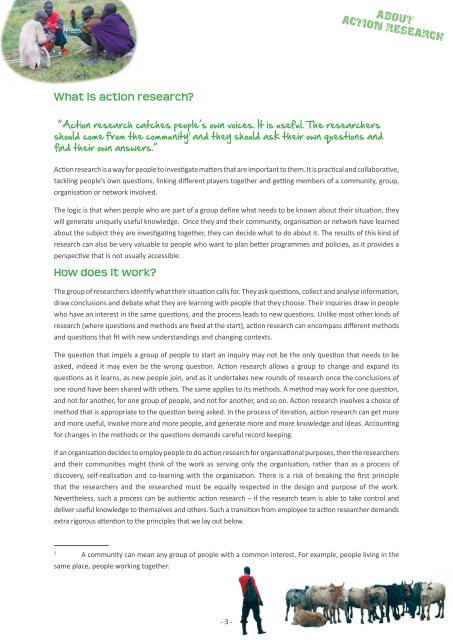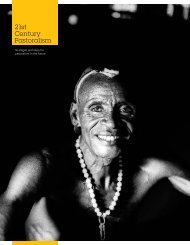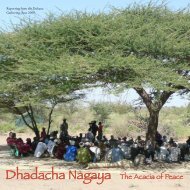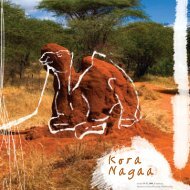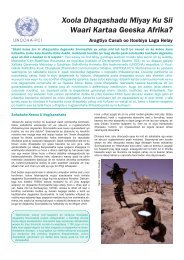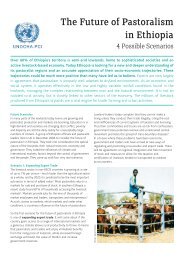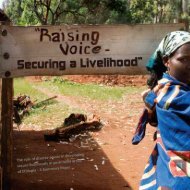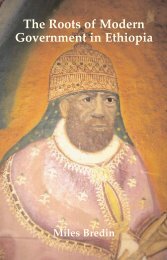Download PDF (1.47Mb) - the Website of the Pastoralist ...
Download PDF (1.47Mb) - the Website of the Pastoralist ...
Download PDF (1.47Mb) - the Website of the Pastoralist ...
Create successful ePaper yourself
Turn your PDF publications into a flip-book with our unique Google optimized e-Paper software.
ABOUT<br />
ACTION RESEARCH<br />
What is action research?<br />
”Action research catches people’s own voices. It is useful. The researchers<br />
should come from <strong>the</strong> community 1 and <strong>the</strong>y should ask <strong>the</strong>ir own questions and<br />
find <strong>the</strong>ir own answers.”<br />
Action research is a way for people to investigate matters that are important to <strong>the</strong>m. It is practical and collaborative,<br />
tackling people’s own questions, linking different players toge<strong>the</strong>r and getting members <strong>of</strong> a community, group,<br />
organisation or network involved.<br />
The logic is that when people who are part <strong>of</strong> a group define what needs to be known about <strong>the</strong>ir situation, <strong>the</strong>y<br />
will generate uniquely useful knowledge. Once <strong>the</strong>y and <strong>the</strong>ir community, organisation or network have learned<br />
about <strong>the</strong> subject <strong>the</strong>y are investigating toge<strong>the</strong>r, <strong>the</strong>y can decide what to do about it. The results <strong>of</strong> this kind <strong>of</strong><br />
research can also be very valuable to people who want to plan better programmes and policies, as it provides a<br />
perspective that is not usually accessible.<br />
How does it work?<br />
The group <strong>of</strong> researchers identify what <strong>the</strong>ir situation calls for. They ask questions, collect and analyse information,<br />
draw conclusions and debate what <strong>the</strong>y are learning with people that <strong>the</strong>y choose. Their inquiries draw in people<br />
who have an interest in <strong>the</strong> same questions, and <strong>the</strong> process leads to new questions. Unlike most o<strong>the</strong>r kinds <strong>of</strong><br />
research (where questions and methods are fixed at <strong>the</strong> start), action research can encompass different methods<br />
and questions that fit with new understandings and changing contexts.<br />
The question that impels a group <strong>of</strong> people to start an inquiry may not be <strong>the</strong> only question that needs to be<br />
asked, indeed it may even be <strong>the</strong> wrong question. Action research allows a group to change and expand its<br />
questions as it learns, as new people join, and as it undertakes new rounds <strong>of</strong> research once <strong>the</strong> conclusions <strong>of</strong><br />
one round have been shared with o<strong>the</strong>rs. The same applies to its methods. A method may work for one question,<br />
and not for ano<strong>the</strong>r, for one group <strong>of</strong> people, and not for ano<strong>the</strong>r, and so on. Action research involves a choice <strong>of</strong><br />
method that is appropriate to <strong>the</strong> question being asked. In <strong>the</strong> process <strong>of</strong> iteration, action research can get more<br />
and more useful, involve more and more people, and generate more and more knowledge and ideas. Accounting<br />
for changes in <strong>the</strong> methods or <strong>the</strong> questions demands careful record keeping.<br />
If an organisation decides to employ people to do action research for organisational purposes, <strong>the</strong>n <strong>the</strong> researchers<br />
and <strong>the</strong>ir communities might think <strong>of</strong> <strong>the</strong> work as serving only <strong>the</strong> organisation, ra<strong>the</strong>r than as a process <strong>of</strong><br />
discovery, self-realisation and co-learning with <strong>the</strong> organisation. There is a risk <strong>of</strong> breaking <strong>the</strong> first principle<br />
that <strong>the</strong> researchers and <strong>the</strong> researched must be equally respected in <strong>the</strong> design and purpose <strong>of</strong> <strong>the</strong> work.<br />
Never<strong>the</strong>less, such a process can be au<strong>the</strong>ntic action research – if <strong>the</strong> research team is able to take control and<br />
deliver useful knowledge to <strong>the</strong>mselves and o<strong>the</strong>rs. Such a transition from employee to action researcher demands<br />
extra rigorous attention to <strong>the</strong> principles that we lay out below.<br />
1<br />
A community can mean any group <strong>of</strong> people with a common interest. For example, people living in <strong>the</strong><br />
same place, people working toge<strong>the</strong>r.<br />
- 3 -


